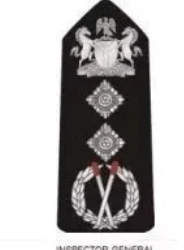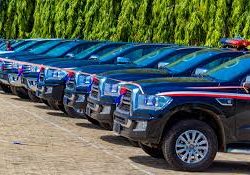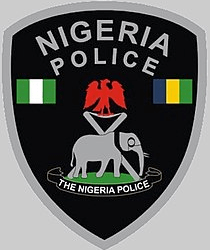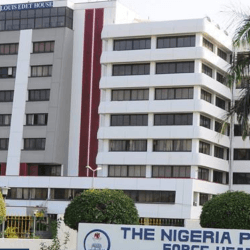The ranks of NSCDC (Nigeria Security and Civil Defence Corps) has Corps Assistant III as the lowest and Commandant General as the topmost position. The Commandant General is the head.

The first Commandant General of NSCDC was Abiola Atunramu. He held office from 2004 to 2005.
The 22 ranks of NSCDC are:
- Commandant General
- Deputy Commandant General
- Assistant Commandant General
- Commandant
- Deputy Commandant
- Assistant Commandant
- Senior Superintendent
- Chief Superintendent
- Superintendent
- Deputy Superintendent
- Assistant Superintendent I
- Assistant Superintendent II
- Chief Inspector
- Deputy Chief Inspector
- Assistant Chief Inspector
- Principal Inspector
- Senior Inspector
- Inspector
- Assistant Inspector
- Corps Assistant I
- Corps Assistant II
- Corps Assistant III
NSCDC has 4 cadres. It is under these under that the ranks of its staff are arranged. The cadres of are:
- Commandant
- Superintendent
- Inspector
- Assistant
The ranks according to cadres are:
(1) Commandant cadre
- Commandant General
- Deputy Commandant General
- Assistant Commandant General
- Commandant
- Deputy Commandant
- Assistant Commandant
(2) Superintendent cadre
- Senior Superintendent
- Chief Superintendent
- Superintendent
- Deputy Superintendent
- Assistant Superintendent I
- Assistant Superintendent II
(3) Inspector cadre
- Chief Inspector
- Deputy Chief Inspector
- Assistant Chief Inspector
- Principal Inspector
- Senior Inspector
- Inspector
- Assistant Inspector
(4) Assistant cadre
- Corps Assistant I
- Corps Assistant II
- Corps Assistant III
NSCDC
NSCDC is a paramilitary body of the Federal Government. It was founded to provide protection and crisis resolution as well as security for public infrastructures. It was first formed in May 1967 during the Nigerian Civil War within Lagos, the then Federal Capital Territory, for the purpose of sensitization and protection of the civilians. It was then known as Lagos Civil Defence Committee.


The Corps had the objective of carrying out educational and enlightenment campaigns in the Federal Capital of Lagos to sensitize civilians on enemy attacks and how to save themselves from danger as many Nigerians then had little knowledge about war and its implications. Members of the Committee deemed it important to educate through tv, radio, newspapers and pamphlets on how to guide themselves during enemy attacks like bombardment, how to identify bombs and dive into trenches during bomb blast.
In 1984, the Corps was reformed as a federal security outfit. In 1988, a major re-structuring occurred and led to the establishment of Commands, including Abuja, and the addition of functions.
On 28 June 2003, an act to give statutory backing to the NSCDC passed by the National Assembly. The act was amended in 2007 to enhance the statutory duties of the corp.
NSCDC is empowered to take legal actions against person(s) suspected to have committed an offence, maintain an armed squad in order to bear fire arms among others to strengthen the corps in the discharge of its statutory duties.




